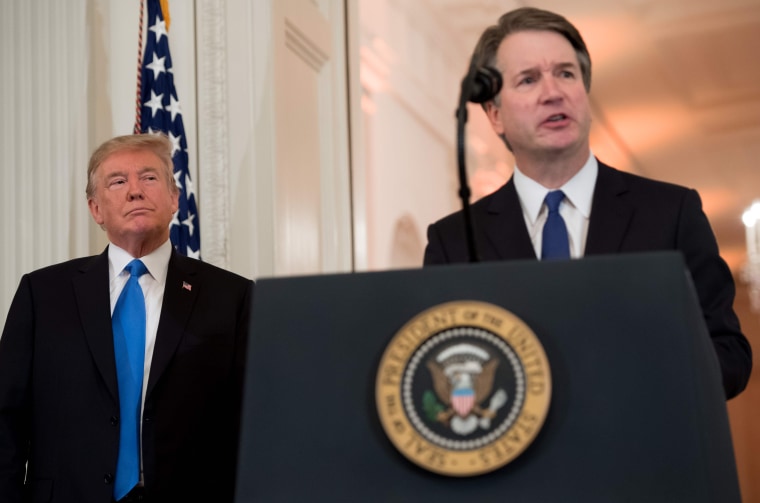Judge Brett Kavanaugh's Supreme Court nomination is controversial for a variety of reasons, but near the top of the list are the conservative jurist's views related to the power of the American presidency.
As has been well-documented, Donald Trump's choice for the high court is on record arguing that sitting presidents shouldn't have to deal with "time-consuming and distracting" lawsuits and investigations. In Kavanaugh's vision, a president shouldn't have to deal with civil suits, criminal probes, or even questions from federal prosecutors.
But the scope of the judge's thinking on the subject is still coming into focus. The Associated Press reported over the weekend:
Supreme Court nominee Brett Kavanaugh suggested several years ago that the unanimous high court ruling in 1974 that forced President Richard Nixon to turn over the Watergate tapes, leading to the end of his presidency, may have been wrongly decided.Kavanaugh was taking part in a roundtable discussion with other lawyers when he said at three different points that the decision in U.S. v. Nixon, which marked limits on a president's ability to withhold information needed for a criminal prosecution, may have come out the wrong way.
In a 1999 round-table discussion, Kavanaugh seemed to recognize just how provocative his perspective was -- he characterized his own comments as legal "heresy" -- but he nevertheless suggested that Richard Nixon may have had the authority to hide incriminating evidence from federal investigators.
During the same discussion, Kavanaugh added that U.S. v. Nixon maybe ought to be "overruled."
Let's note for context that U.S. v. Nixon was an 8-0 ruling in 1974 -- William Rehnquist, having worked in Nixon's Justice Department, recused himself in the case -- that said the then-president had to honor a subpoena from a special prosecutor investigating the Watergate scandal. In the decades since, the consensus view is that the Supreme Court's historic decision was the right one.
It appears to be a consensus that Kavanaugh is not a part of.
Senate Minority Leader Chuck Schumer (D-N.Y.) stated the obvious, noting that this "bodes very poorly for any decision that Kavanagh might make to hold President Trump accountable." Schumer's statement added, "It is also very confounding that the common thread that has emerged thus far in the cases that Kavanaugh is willing to openly criticize is their relation to presidential power and accountability."
It's a critically important point. Far-right interest groups gave Trump a list of conservative jurists to choose from, and the scandal-plagued president chose the one conservative judge who believes scandal-plagued presidents shouldn't ever have to worry about legal "distractions" so long as they're in office.
It's quite a coincidence that Kavanaugh ended up as Trump's nominee, isn't it?
Postscript: If you missed it, Rachel's segment along these lines from Friday night's show is well worth your time. The segment was principally about the conversation Michael Cohen recorded with Trump about one of the president's alleged mistresses, but note how this ties to the Kavanaugh nomination.
Update: The article about the 1999 event was part of thousands of pages of documents that Kavanaugh provided to the Senate Judiciary Committee as part of the confirmation process. The committee released the documents on Saturday.
